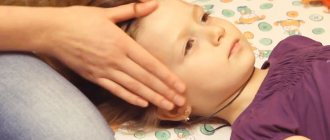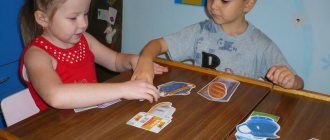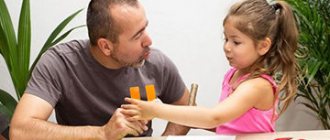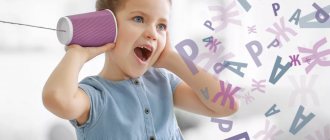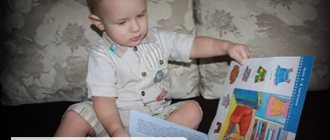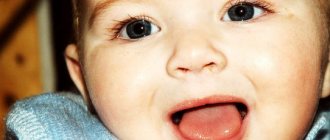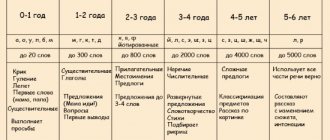Children's poems for speech development. Every child develops and becomes familiar with the world around him through speech. From the age of one month, babies begin to prepare to pronounce sounds. At the initial stage, they demonstrate this by humming, the next step is already accompanied by the pronunciation of syllables. When a child clearly learns to speak syllables, he will try to put them into words. After this, children develop the skills to connect words in the form of phrases and sentences. Your baby's ability to speak develops through reading and learning nursery rhymes. Rhyme helps children understand poems more easily and remember them better.
Speech development in preschool children: lecture
Contents of the lecture
- Tasks of speech development and education of preschool children
- Child speech development from birth to school
- Child speech development from birth from 0 to 6 months
- Child speech development from birth from 6 months to 1 year
- Child speech development at 1 year
- Child speech development at 2 years old
- Child speech development at 3 years old
- Speech development of a child aged 4–5 years
- Speech development of a child aged 5–6 years
- Speech development of a child aged 6-7 years
Download lecture
You can download the lecture “Speech Development in Preschool Children” HERE
Assignment for students
- Study the contents of the lecture “Speech development of a preschool child”
- Fill out the table in your notebook and submit it for verification:
Table: Speech development of a preschool child
| Child's age | Speech standards: what you should be able to do | Speech development techniques |
How to conduct classes at home correctly
It is not necessary to immediately run to a speech therapist. To begin with, you can try exercises for speech therapy classes for children 4-5 years old at home. They will help the child master correct speech, learn to hear and pronounce missing sounds.
Children should definitely be taught at home so that they learn how to pronounce sounds correctly.
Typically, speech therapists advise following these simple rules:
- Exercises should be performed every day, always in a child-friendly environment.
- Be sure to conduct lessons in a playful way. It is important to captivate the child so that the tasks do not seem boring and uninteresting to him. You can even arrange a sort of competition to see who can complete the tasks better or faster.
- You cannot criticize or make sarcastic remarks to your child. So the desire to learn something new will disappear completely. Be sure to praise your child when he completes a task. Even if something doesn’t work out, you need to praise him for trying.
- For classes, be sure to use literature that is designed to help parents teach their children independently. There are special reference books on speech therapy, which contain many different exercises for children, as well as recommendations for parents.
- A speech therapy exercise for children 4-5 years old can be turned into pleasure if you correct your speech by studying rhymes and tongue twisters. They will not only allow the child to quickly grasp the necessary sounds, but will also have a positive effect on the development of memory.
- You need to show your child an example of correct speech. Pronounce all words clearly so that the baby understands and clearly hears what is being said to him. You need to talk to him as much as possible, have conversations on any topic, tell different stories.
What to do if a child speaks poorly at 6 years old?
High-quality warm-up for lips and tongue
Warming up the lips and tongue plays an important role in the formation of correct speech.
Note! The baby will begin to pronounce words more clearly, without swallowing the ending.
Exercises as a warm-up:
- Stretch your lips in a smile without showing your teeth. You should try to smile as widely as possible.
- Pull your lips forward as if they were an elephant’s proboscis.
- Take turns inflating one or the other cheek, then retract them in the same order.
- Open your mouth and pull your lower jaw as low as possible, while holding your tongue to the roof of your mouth.
- Open your mouth, stick out your tongue. Then put it in your mouth. Do this exercise for 15 seconds.
- Pull out your tongue and blow on a piece of cotton wool on the table until it falls off the table. Blowing with lips is prohibited.
- Use the tip of your tongue to first move along the upper teeth from the inside, then along the lower ones.
- “Scratch” your tongue with your teeth, resting on the lower gum.
Important! To achieve visible results, you need to perform these exercises regularly. Each of them must be repeated at least 5-6 times.
For a child aged 2 years
Children's poems for speech development. From the age of 2, children can read speech therapy poems. They are excellent at training the pronunciation of certain sounds and reinforcing clearly defined letters and syllables. 2 years is the right age to teach a child such rhymes.
Cat - midge
A cat sat on the window
The cat wants to eat a midge
Cat grabs a midge with its paw
Where is the midge? Not to be seen.
Heap - cloud
The wind from the sea drives the cloud
We rake the leaves into a pile
Rain cloud in the sky
The pile of garbage is large.
Pechka - river
The owner lit the stove
The little frog jumped into the river
Coal flared up in the stove
The frogs have a house in the river.
Funny speech therapy poems for children
Methodology of Akimenko V. M.
Manual by V.M. Akimenko “speech therapy examination of children with speech disorders” presents a system for examining children starting from the fifth year of life. Particular attention is paid to the ease of application of techniques, reliable and high results. To help speech therapists, the book contains many tables to record the results.
Do-it-yourself didactic material for kindergarten
Currently, in addition to the manual, there is a special diagnostic case with teaching materials and a computer program disk that simplify the examination process.
Diagnostic case for speech therapist
Procedure for conducting the examination
The examination takes place on a computer. The child, looking at the screen, completes tasks that are decorated in bright colors. At the same time, the speech therapist can record progress and write comments.
At will, the specialist can use items from the methodological set.
All information in the program is recorded automatically.
Structure
The structure of the survey includes sections:
- Pronunciation of sounds
- General, articulatory and fine motor skills,
- Facial expressions, muscles,
- Phoneme perception
- Speech understanding
- Vocabulary,
- Coherence of speech.
Each section has its own tasks.
Analysis of the results obtained
After the examination, the speech therapist can conduct an analysis and justify his conclusion. Afterwards, the specialist draws up an individual work plan and a scheme of corrective measures.
With the help of tables, it is possible to track the child’s subsequent progress.
Program capabilities and scope
The program has many features:
- Maintain individual cards with data and subsequent work,
- The database and task sorting occur automatically,
- Speech therapy diagnostics is carried out in stages,
- Speech maps are formed,
Additional Information . If desired, you can create group protocols with examination results and print speech cards.
This manual can be used in their practice:
- Speech therapists,
- defectologists,
- Psychologists,
- Preschool teachers.
For a child aged 3 years
Children from three years old are suitable for poems that are easy to understand by ear and quite understandable. They must teach the child to correctly pronounce sounds that the baby does not yet know how to pronounce. After reading one poem to their child, parents can ask questions about what they read. The child must accept what this poem is about and draw certain conclusions. At their leisure, close family members of the baby can independently compose short quatrains and conduct activities with him.
An example of rhymes for speech development for children aged 3 years.
Airplane
The plane is flying,
The plane hums: “Oooh!”
I'm flying, flying, flying!
I’ll fly wherever I want!”
Should your child be vaccinated: read our article HERE
Vegetables
Listen to the story, don't be bored
Yes, notice mistakes.
Grandson loves vegetables:
Pear, apple, onion
And carrots and lemon -
He is friends with vegetables.
Hedgehogs laugh
The groove has two boogers
They sell pins to hedgehogs. You can't help but laugh! Everyone can’t stop: “Oh, you stupid boogers!” We don’t need pins: We ourselves are studded with pins.”
For a child aged 4 years
Children's poems for speech development. Children aged 4 years really like to listen to rhymes that contain animals, birds, insects, and seasons. They can be cheerful and sad, funny and instructive. All works are sure to evoke certain feelings in the child: joy, compassion, pity. Often, after reading a poem about those who are in trouble or trouble, children feel responsible for them and want to help them. Of course, relevant topics in poems for their age are the seasons, animals, everyday objects and things.
Winter
We ask mom for a fur coat - So autumn has returned to us. We'll walk in fur coats and collect mushrooms. I'll pick a bouquet of daisies and weave a wreath myself. Admire the daisies, Our winter is winter. The following poem trains the pronunciation of the letters: “r” and “l”.
“HOW TO STRENGTHEN A CHILD’S IMMUNITY” read HERE
Anthill
In an anthill under a willow, ants live beautifully. Their house is a fairy-tale palace, Every resident in it is a fighter. From childhood they learn to shoot, to protect the queen - mother. But the queen does not spin; she lays white eggs. Ants protect their royal eggs. And they live in a happy country In a palace under an old willow tree. You can invite your child to memorize and repeat this poem.
Boots
Dressed up the legs in new boots. You walk, legs, straight along the path. You walk, stomp, don’t splash through puddles, don’t walk into the mud, don’t tear your boots.
A fun song for speech development with movements
Complex No. 7
“Oh, how delicious!”
- Pussy lapped milk
And she licked her mustache all over. Oh, how delicious!
(We show with our tongue how the pussy laps. If the baby finds it difficult to perform this movement, pour a drop of milk or whatever he likes on a saucer. Then the movement changes: invite the baby to lick his lips, like a pussy licks its mouth)
- A wasp flew to us,
There is jam from the table,
Long, thin proboscis. Oh, how delicious!
(stick your tongue out and hold it for 5-10 seconds)
- And the green frog,
I caught a fly with my tongue. Oh, how delicious!
(The mouth smiles, because the frog has a wide mouth. The clenched teeth should be visible. We open the mouth slightly, stretch the tongue as far forward as possible, and then hide it behind the teeth again)
- Our Andryushka is a great guy
Licking a sweet lollipop. Oh, how delicious!
(we imitate the movement of the tongue, as if we were licking a lollipop. You can give the baby real candy)
- Let's lick our sweet lips -
both higher and lower!
(Lick first the upper and then the lower teeth).
For a child aged 5 years
Parents should know that their little one at the age of five will not focus his interest on any one object. On this basis, when choosing poems, you should focus on works that use things that are understandable to a child. If you need to learn a poem, it should be short and simple.
Where is whose house?
The sparrow lives under the roof, In a warm hole there is a mouse's house. The frog has a house in the pond. A bird's house - a warbler - in the garden. - Hey chicken, where is your house? He is under his mother's wing.
Physical exercises in kindergarten
Horse
I climbed onto the horse and hold on with my hands. Look at me. I went to my mother.
cat house
Ding-dong, ding-dong, The cat's house caught fire. A chicken is running with a bucket, But she didn't get there, She spilled the water.
For a child aged 6 years
Children's poems for speech development. One of the main aspects for a baby is his family. Poems on this topic are very suitable for children aged six. Thanks to these works, the child understands and realizes that it is most correct to value and love in life, and learn to set priorities correctly. Preschoolers will be pleased to read a warm and touching work to their close family members.
Dad
Dad reads books to me. I value my friendship with him. I’ll retell each fairy tale out loud for Dad. I’ll retell it out loud. Then I’ll take the book. I’ll read it aloud to dad. Dad will retell the story. It will take my breath away. That’s how we read to each other. We retell it out loud. And it’s so fun in the apartment. And it’s so fabulous all around.
How to properly develop a child physically while he is small?
Children at this age will be no less interested in riddles about family members.
Who will teach us how to hammer a nail, not as a joke, but seriously? Who will teach you to be brave? If you fall off your bike, don’t whine, And scratch your knee, and don’t cry? Of course... (Dad)
He will always treat you with jam, he will set the table with treats, Lada is our sweetheart, Who? - Dear... (grandmother)
A very relevant topic for children aged six is saying goodbye to kindergarten.
Goodbye, kindergarten!
The kindergarten gave us a lot of knowledge and skills into the world of discoveries, adventures and success! And now we are invited to visit the school - 1st grade! Let learning give you joy every day and every hour!
How to prepare a child for school? What to do? How to practice?
For a child aged 7
Most children are older and study poems by many famous poets: Pushkin, Ershov, Marshak, Mikhalkov, Chukovsky and other authors. Poems for remembering months, days of the week, numbers and letters are very good for training your memory.
Months
Eternally following each other The months go in a circle: In January and February Snow lies all over the earth. In March and April the sound of drops can be heard. As the snow and ice melt, May will come to us with flowers, But in June and July it will become hot as in a saucepan. And in August and September we will reap the harvest. In October and November, the forest beast will fall asleep in a hole, and when December comes there will be a holiday - New Year! Let's buy a new calendar and January will come again.
The letter a
Without the letter A you cannot write mom, Without the letter A you cannot write dad. And many of the words that you hear, without the letter A, you also cannot write. Well, for example, the word drum, Or, say, hare and wild boar. That's why we need the letter A, That's why the letter A is important to us. It’s not for nothing that no matter what you say, She is in first place in the Alphabet.
Unit
Unit, unit - The number is thin, like a knitting needle. She is very slender, visible to everyone. She is the first to sing a song, she is always the first to dance, from this number every day we count down all our affairs. There is an excellent motto, children, that one is responsible for everything, the Musketeers honor it,
They are eager to fight for one.
Don't know what to cook for a children's party? Read our article “WHAT TO PREPARE FOR A CHILD’S BIRTHDAY”
Exercises for general speech development at home
At home, it is imperative to regularly conduct speech therapy classes for children 4-5 years old, the exercises of which include not only the speech part, but also gymnastics for the speech organs and fingers.
Finger gymnastics
This set of simple exercises stimulates the part in the brain center that is responsible for correct speech. This is why fine motor skills classes are needed not only for the little ones, but also for preschoolers.
Finger exercises stimulate the part of the brain responsible for correct speech
All exercises are done 8-10 repetitions:
- “Opening” and “closing” the fingers on each hand. First one by one, then together. You can gradually increase the speed.
- Place your hands on the table: the left one touches the table with the palm, the right one with the back. Then at the same time you need to turn your hands over.
- First, draw a river: fold your hands, palms up, as if you have water in them. Then depict a steamboat - put your palms together, press your thumbs together and lift them up. Then depict the fish that have arrived: press all your fingers together, palms together and make movements with your hands, as if a fish is swimming.
- Draw a tree with branches - arms vertically, fingers spread out in different directions. Then show the roots of the tree - in the same position, move your hands with your fingers down. Then show leaf fall: quickly, quickly clench and unclench your fingers.
Articulation gymnastics
These exercises are aimed at developing the tongue, the main organ responsible for the correct pronunciation of sounds.
Open lesson on speech development in senior groups
Note! Thanks to regular training in articulation gymnastics, the child will soon begin to pronounce even the most difficult sounds.
- Smile as wide as possible, teeth are closed, exactly on top of each other. Stay in this position and count 10 seconds.
- Pull your lips forward and pretend as if an elephant is drawing water with its trunk. Stay for 10 seconds in this position.
- Pretend to be a snake: smile broadly, stick out your tongue like a tube, then hide it back.
- Open your mouth wide and make a clicking sound with your tongue, imitating a horse. At the same time, it is important to ensure that the child’s lower jaw is motionless and only the tongue is working.
- Smile widely, stick out your tongue as far as possible and lightly squeeze it between your teeth. In this position, “pull” the tongue back into the mouth.
- Open your mouth wide, stick out your tongue and pretend to be a clock - move your tongue from one corner of your mouth to the other.
Repeat all these exercises 8-10 times or for 10-15 seconds.
Games for developing phonemic sound
Speech therapy games for 4-5 year old children to develop phonemic sound must be included in daily classes. They are simple and at the same time interesting, and the results will not take long to arrive. After just a month of regular exercises, the quality of children's speech will noticeably improve.
- "Game of Silence" This game is very simple. The child is asked not to make a sound for 2 minutes and close his eyes. As soon as the time is up, then ask the baby to tell what sounds he heard.
- "Clap-stomp." The essence of the game: agree in advance with the child which sound he will stomp on and which sound he will clap on. For example, if he hears the sound [w], then he stomps his foot, if the sound [r], then he claps his palms. Next, the adult names different sounds, and when the child hears the ones he needs, he claps or stomps.
- "Catch the word." The essence of this game is simple: the child is given a word, upon hearing which he will have to clap his hands. Next, the adult names several words in turn that sound similar. As soon as the child hears what he needs, he should clap his hands.
To develop phonemic sound, it is necessary to regularly play speech therapy games


